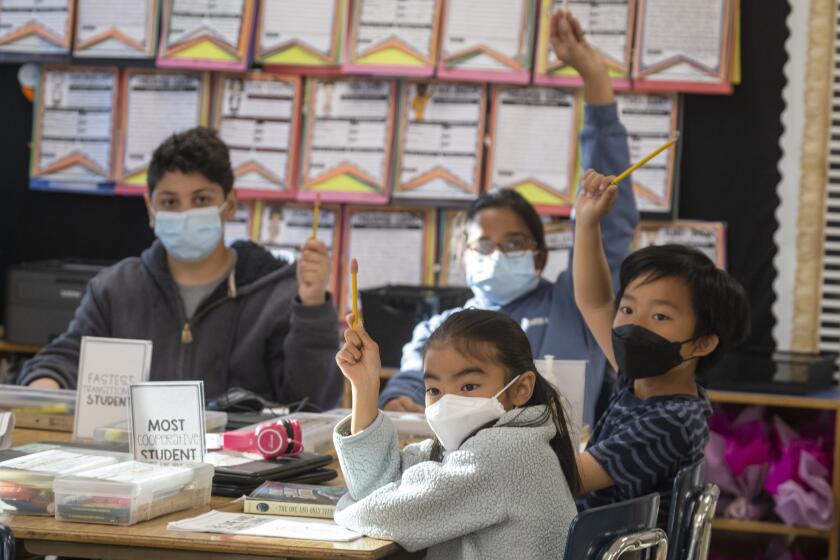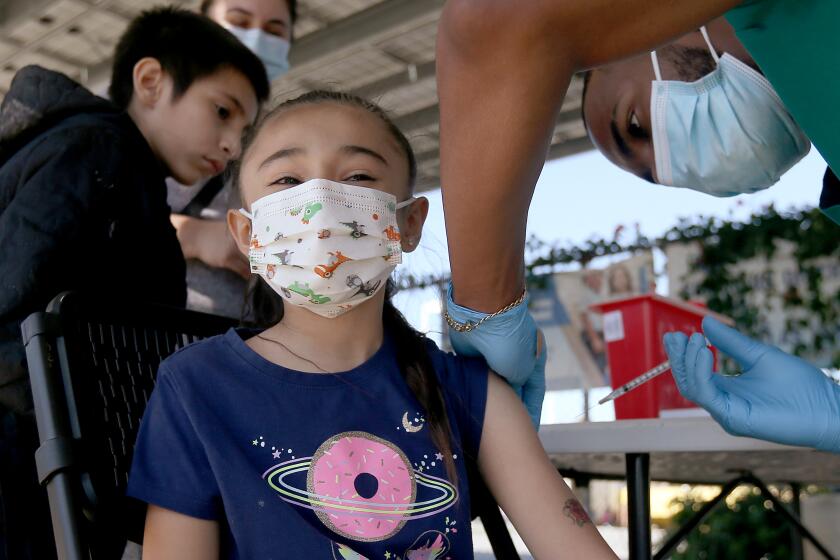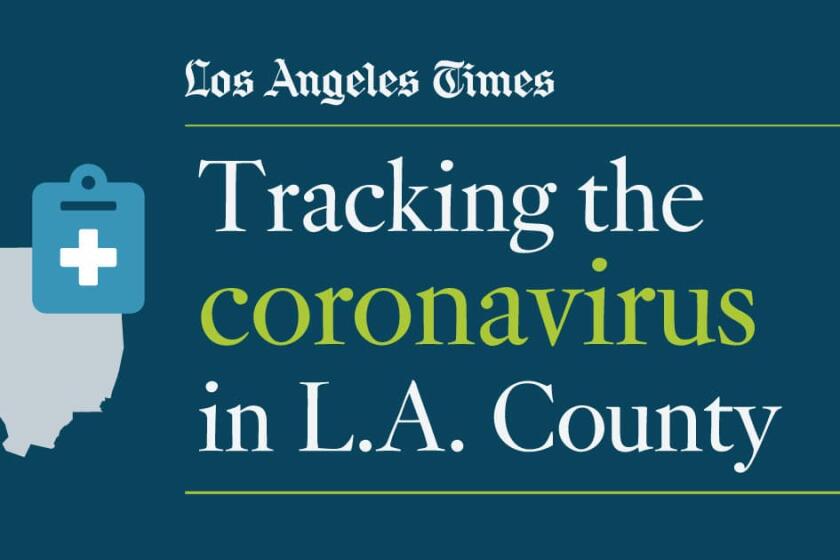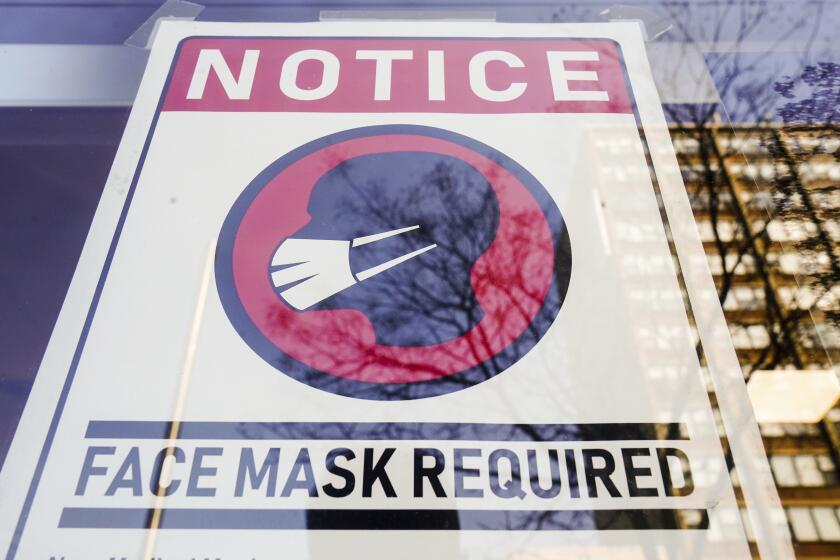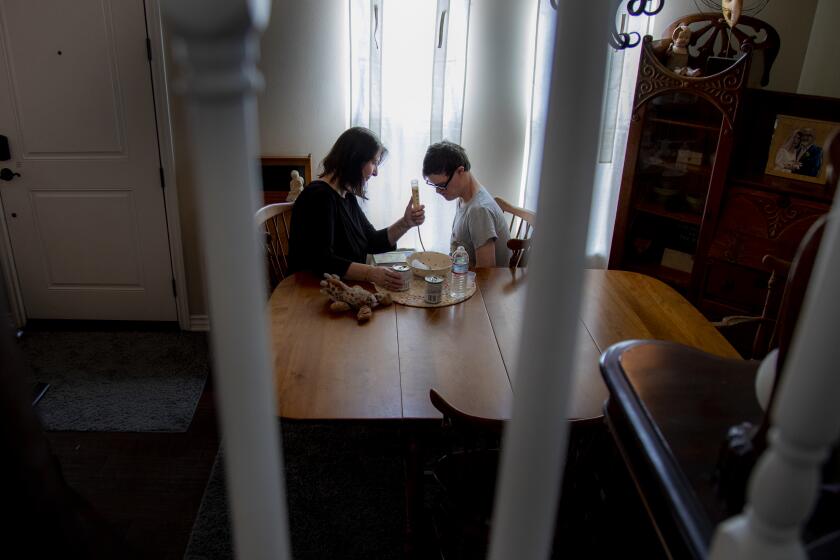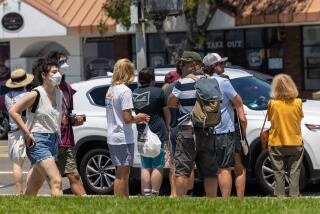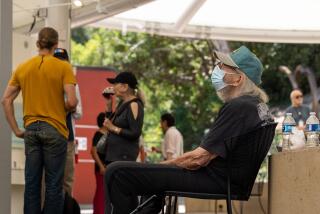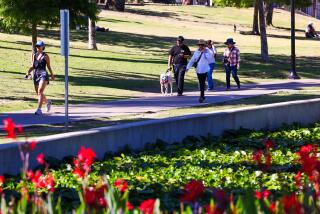Coronavirus cases on the rise in L.A. County, prompting calls for spring break caution
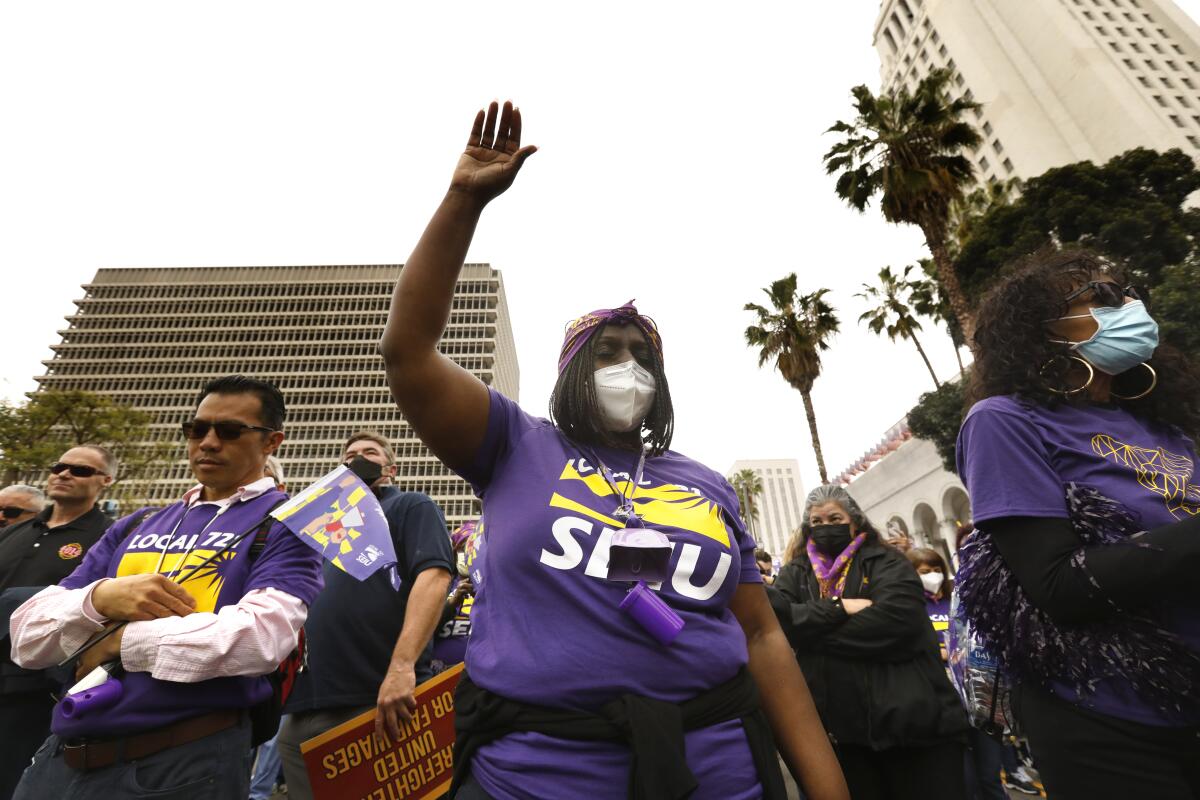
- Share via
Coronavirus cases are once again on the rise in Los Angeles County, according to data released Monday, prompting officials to urge residents to keep up safety protocols as the spring break holiday season arrives.
Data show that for the seven-day period that ended Monday, an average of 960 new cases were reported daily countywide, which equates to 67 cases a week for every 100,000 residents. That’s up 23% from the previous week, when L.A. County reported an average of 783 cases a day.
Caseloads of this magnitude remain a far cry from the tens of thousands of new daily infections during the height of the Omicron surge. In mid-January, L.A. County was reporting 42,000 new coronavirus cases a day.
An increase in coronavirus cases at schools is occurring in part because of the lifting of indoor mask requirements, L.A. County health officer says.
Nevertheless, the trendline is the source of some concern, especially given the proliferation of BA.2 — an Omicron subvariant estimated to be 30% to 60% more contagious than the earlier version that swept the globe last fall and winter.
Scientists are also now tracking an even more potentially contagious subvariant, XE, which some early estimates indicate may be 10% more transmissible than BA.2.
“The evidence is becoming clearer that given the current approved vaccines and the reality of a mutating virus, some of us will need to boost our immune systems a couple of times during the year in order to be optimally protected,” county Public Health Director Barbara Ferrer said in a statement. “This includes those infected with Omicron over the winter, since natural immunity ... also wanes over time.”
Given that many residents are likely to travel or gather in the coming weeks — either for spring break or to mark holidays such as Easter, Ramadan or Passover — Ferrer said it remains important to “do our very best to make use of the powerful tools at hand, vaccinations, boosters, testing, and masking, to keep ourselves and those most vulnerable to severe illness, as safe as possible.”
There are more than 1.7 million L.A. County residents age 5 and up who haven’t received a single vaccination dose, and an additional 2.8 million vaccinated residents who haven’t received a booster, even though they’re eligible for one.
The increases are modest, and it’s unclear whether this a brief hiccup, the beginning of a larger wave of cases or something in between.
L.A. County’s coronavirus case rate hit a post-winter surge low of about 609 cases a day from March 18 to 24. That was about two weeks after the region ended its universal requirement to wear masks in indoor public spaces — one of the last counties in California to do so.
Since then, the countywide case rate has ticked upward, a development officials have said is likely fueled by a combination of waning immunity, the loosening of masking rules and the spread of BA.2.
The daily reported caseload is just one of many metrics health officials utilize to track and assess the pandemic’s trajectory. Another, the proportion of conducted tests that are confirming coronavirus infection, has also inched up slightly as of late, but remains low at 1%, county health officials said.
And while cases have crept up a bit, the number of people hospitalized with COVID-19 countywide has continued to trend downward. As of Sunday, 265 coronavirus-positive patients were hospitalized countywide — down about 8% from a week ago.
The latest maps and charts on the spread of COVID-19 in Los Angeles County, including cases, deaths, closures and restrictions.
Experts in California have said there are unmistakable signs of an uptick in coronavirus cases in the state. But whether this latest uptick ultimately proves to be a temporary blip or the harbinger of something more significant, however, remains to be seen.
For the weekly period that ended Thursday, California was averaging about 2,800 cases a day, or 50 cases a week for every 100,000 residents, up 9% over the prior week.
Orange County’s case rate is also increasing. Orange County’s case rate is about 134 cases a day, or 30 cases a week for every 100,000 residents, up 12% over the prior week.
San Francisco, which now has one of California’s highest case rates, on Thursday was recording about 127 cases a day, or 102 cases a week for every 100,000 residents, a 6% increase over the prior week.
A coronavirus case rate of 50 or more cases a week for every 100,000 residents is considered substantial, while a rate of 100 or more is considered high.
Dr. Robert Wachter, chair of UC San Francisco’s Department of Medicine, tweeted Thursday that the percentage of asymptomatic patients testing positive at UC San Francisco’s hospitals had risen to 2%, up from 1% in late March.
“If you’ve let guard down, time to be more careful,” he wrote.
By Monday, the rate had dipped back down to 1.6%, Wachter said in an email. That means that in San Francisco, there’s a 28% chance that at least one person attending a party with 20 asymptomatic people will test positive for the coronavirus.
Some experts are optimistic that the case numbers so far offer glimmers of hope that this spring will not bring a second Omicron surge on the magnitude of those seen elsewhere — such as Britain, where hospitals have once again come under strain.
Dr. Eric Topol, director of the Scripps Research Translational Institute in La Jolla, tweeted Saturday that “it’s clear that wave 6 (BA.2), yet still in the works, will not resemble” the fifth surge of the pandemic, or last winter’s Omicron surge.
But Myoung Cha, chief strategy officer for San Francisco-based Carbon Health, disagreed with “confident takes … that this surge won’t be big.” He noted many people this year are self-diagnosing with at-home tests — the results of which are not reliably reported to the government.
By contrast, lab tests conducted at official facilities are automatically reported to the authorities.
“The current case rates are massively undercounted versus prior surges,” Cha tweeted Sunday.
Philadelphia has become the first major U.S. city to reinstate its indoor mask mandate after seeing a sharp increase in coronavirus infections.
As is the case anytime COVID-19 shows signs of resurgence, the question on many people’s minds is when, or whether, health authorities may consider reimplementing restrictions.
In Philadelphia, where cases have jumped by more than 50% over the last 10 days, officials on Monday announced the return of an indoor mask mandate, effective April 18.
Philadelphia had preexisting criteria in place that would trigger a return to a mask order when average new cases a day exceeded more than 100 and when cases have risen by more than 50% in the previous 10 days. On Monday, officials reported that the city of 1.58 million people was averaging 142 new cases a day, or 63 cases a week for every 100,000 residents.
Philadelphia Mayor Jim Kenney said the return of the mask mandate in indoor public settings was needed to prevent higher case rates.
“Our city remains open; we can still go about our daily lives and visit the people and places we love while masking in indoor public spaces,” Kenney tweeted.
A number of universities in the Northeast have announced a return to universal mask policies. Columbia University, Georgetown University and American University have announced the return of indoor mask requirements recently.
So far, officials in L.A. County and the state have not indicated that conditions warrant the imposition of new measures or mandates — though, in both cases, they still urge residents to mask up indoors while in public.
Speaking with reporters last week, though, Ferrer said people should be concerned about the rise in the number of school outbreaks countywide. There were 14 new outbreaks in K-12 schools in L.A. County for the week that ended Thursday. For the previous week, there were four.
She noted that in some other settings where masking is still required — like nursing homes and homeless shelters — there has not been an increase in outbreaks.
Ferrer also expressed some optimism that a second increase in Omicron cases this spring wouldn’t be as bad as the winter surge. People who have been infected with the earlier Omicron subvariants earlier this winter, BA.1 or BA.1.1, are likely to have a degree of immune protection against the latest Omicron subvariant, BA.2, at least for the near future.
“I am hopeful … that given what we’ve seen and what we’re doing, we should be able to avoid a really big surge,” Ferrer said.
As government agencies have cast off pandemic protections, many immunocompromised and disabled people have felt forgotten.
In a round of interviews with morning network shows, Dr. Ashish Jha, the incoming White House COVID-19 Response Coordinator, said he’s “not overly concerned right now” about the rise in cases nationally.
“Case numbers are rising. … We were expecting this, because we saw this in Europe a few weeks ago,” Jha said on NBC’s “Today” show. “But the good news is: We’re coming off of some very low infection numbers. Hospitalizations right now are the lowest they have been in the entire pandemic.
“So we’ve got to watch this very carefully. Obviously, I never like to see infections rising, I think we’ve got to be careful, but I don’t think this is a moment where we have to be excessively concerned,” Jha said.
More to Read
Sign up for Essential California
The most important California stories and recommendations in your inbox every morning.
You may occasionally receive promotional content from the Los Angeles Times.
